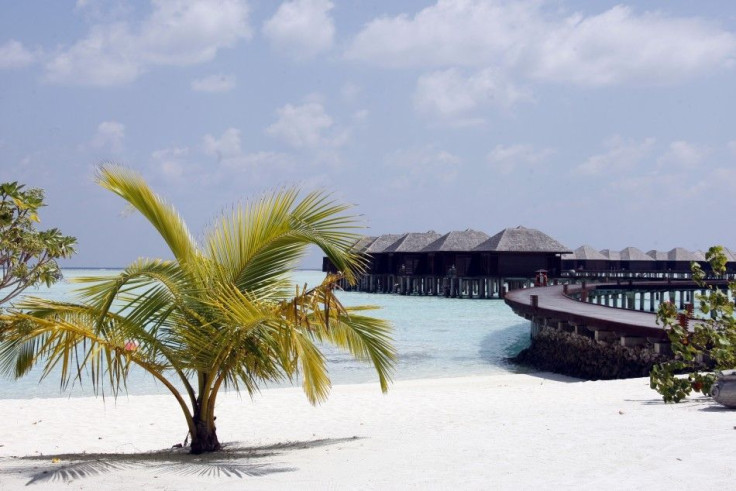Maldives Tourism Boycott Puts President On The Defense

A petition urging tourists to boycott the Maldives until it reforms its judicial system has gained well over 2 million signatures -- twice the number of tourists that visit the small Indian Ocean nation each year -- since it went up on Avaaz.org three weeks ago, but the Maldivian president said this week that a boycott would “only serve as a setback to the economic opportunities and rights we are all striving to uphold for women, girls and the hardworking Maldivian people in general.”
The petition stems from the case of a 15-year-old rape victim who was sentenced in February to 100 lashes for premarital sex. The young girl, from the island of Feydhoo, reportedly confessed to having consensual sex during an investigation into separate rape allegations against her stepfather and other men on the island. The stepfather allegedly killed the child she bore, and the girl’s flogging has been deferred until she turns 18.
“As concerned global citizens, we call on you to do more to protect vulnerable women and children,” the petition’s creators wrote in an open letter to President Mohammed Waheed Hassan. “We welcome your government’s initial intervention in the case of the 15-year-old rape victim, but real justice will only be delivered when you end the practice of flogging in the Maldives, and change the law so that it better protects the victims of rape and sexual abuse.”
President Waheed came to power in February 2012 following a highly controversial mutiny by sections of the police and military. Political tensions remain high in the Muslim nation leading up to presidential elections later this year.
Waheed’s Gaumee Ithihaad Party recently declared itself in coalition with religious conservatives in the Adhaalath Party, which publicly endorsed the young girl’s flogging under Islamic Sharia law.
Adhaalath stated: "The purpose of penalties like these in Islamic Sharia is to maintain order in society and to save it from sinful acts. It is not at all an act of violence. We must turn a deaf ear to the international organizations which are calling to abolish these penalties, labeling them degrading and inhumane acts or torture."
President Waheed, meanwhile, has taken a contradictory tone. He’s been extremely defensive of the case, if not downright perplexed by the international attention it has received.
“We would like to thank the international community for their concern in the case of the 15-year-old girl who recently received a flogging sentence here in the Maldives,” he stated Tuesday. “Currently, the case is being appealed and I have urged the judiciary to resolve this matter as quickly as possible. This case should never have been presented in the courts and we are working to ensure that cases like this are never brought to the courts again.”
Waheed claimed the young woman was under the care of the Ministry of Gender, Family and Human Rights, and that Attorney General Azima Shukoor had met with her to ensure that she was receiving the appropriate physical and psychological counseling.
“As both the President and as a father, I am fully committed to protecting and advancing the rights of women and girls in the Maldives and throughout the world and share your deep concern about this young victim,” Waheed said. “The Maldives is a young democracy working to balance our religious faith with our new democratic values. I ask that you support us and join us as partners as we work through this challenge.”
The Maldives welcomed a modern democratic constitution in 2008, but much of the corresponding legislation aimed at reforming the criminal justice and juvenile justice systems has yet to be enacted. Many bills essential to reforming the system are pending, including amendments to the Childs Rights Act and the revised Penal Code and Juvenile Justice Bill.
Moreover, the Maldives Constitution does not allow any law that contradicts the tenets of Islam.
A report on extremism in the Maldives published by the West Point military academy’s Combating Terrorism Center noted that growing religious extremism and political instability could risk negatively affecting its tourism industry, which accounts for roughly a third of the nation’s GDP.
“Despite its reputation as an idyllic paradise popular among Western tourists, political and religious developments in the Maldives should be monitored closely,” the report concluded.
The Maldives signed a $150,000 per month contract with public relations group Ruder Finn to try and improve the country’s image internationally after political instability scared many visitors away last year. It also inked a deal with the BBC through sponsorship of its weather services for $250,000 to push its new slogan: “Sunny Side of Life.”
Numerous boycotts over the past year, however, have branded the islands as a place to see the “Cloudy Side of Life.” A pro-democracy group took over the Twitter hashtag #sunnysideoflife last year to blast the nation’s alleged injustices. Amnesty International also released a publication titled “Another Side of Paradise,” highlighting alleged human rights abuses occurring in the shadows of the popular resorts.
Nevertheless, recent statistics from Maldivian tourism officials claim arrivals were up 14.6 percent in the first quarter of 2013, compared with the turbulent first quarter of 2012. Declining Western European demand, officials noted, failed to offset growing interest from Asia and Eastern Europe.
Whether or not the current boycott will affect second quarter results remains to be seen.
© Copyright IBTimes 2024. All rights reserved.












